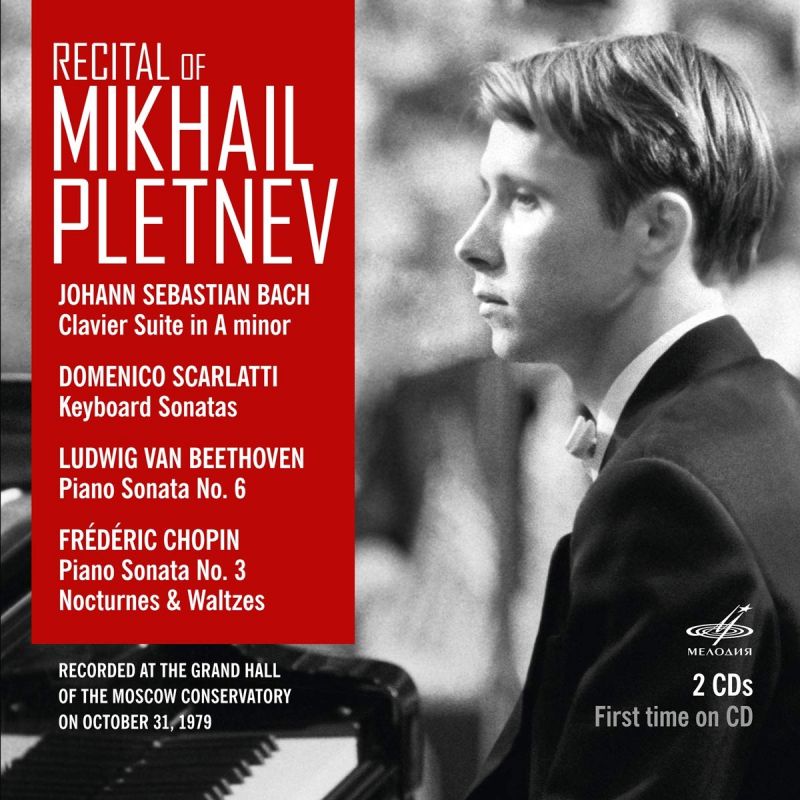Mikhail Pletnev: Live from Moscow, 1979
View record and artist detailsRecord and Artist Details
Composer or Director: Johann Sebastian Bach, Fryderyk Chopin, Domenico Scarlatti, Ludwig van Beethoven
Genre:
Instrumental
Label: Melodiya
Magazine Review Date: 05/2019
Media Format: CD or Download
Media Runtime: 95
Mastering:
DDD
Catalogue Number: MELCD1002581

Tracks:
| Composition | Artist Credit |
|---|---|
| Suite |
Johann Sebastian Bach, Composer
Johann Sebastian Bach, Composer Mikhail Pletnev, Piano |
| Sonatas for Keyboard Nos. 1-555, Movement: F, Kk17 (L384) |
Domenico Scarlatti, Composer
Domenico Scarlatti, Composer Mikhail Pletnev, Piano |
| Sonatas for Keyboard Nos. 1-555, Movement: G minor, Kk8 (L488) |
Domenico Scarlatti, Composer
Domenico Scarlatti, Composer |
| Sonatas for Keyboard Nos. 1-555, Movement: G (L103) |
Domenico Scarlatti, Composer
Domenico Scarlatti, Composer Mikhail Pletnev, Piano |
| Sonatas for Keyboard Nos. 1-555, Movement: D (L465) |
Domenico Scarlatti, Composer
Domenico Scarlatti, Composer Mikhail Pletnev, Piano |
| Sonata for Piano No. 6 |
Ludwig van Beethoven, Composer
Ludwig van Beethoven, Composer |
| Sonata for Piano No. 3 |
Fryderyk Chopin, Composer
Fryderyk Chopin, Composer Mikhail Pletnev, Piano |
Author: David Fanning
True, Pletnev might have been suspected of a degree of showing off in his choice of one of the most out-of-the-way of Bach’s Suites as a vehicle for his scintillating fingerwork. The supercharged Menuet is certainly like nothing ever danced by humankind and the Gigue has a whiff of victor ludorum exhibitionism. But then there are the enthralling flexibility and sensitivity to line he brings to the Allemande and Sarabande, neither of which strays outside the boundaries of stylishness. What sounds like slightly muted applause perhaps indicates some mixed feelings in the Moscow Conservatory cognoscenti.
If the audience hadn’t already registered what a special artist they had before them, they must surely have done so with the four Scarlatti sonatas. Not only are the repeated notes of machine-gun-like precision, not only are expressive corners turned with ultra-winsome refinement, but there is some hair-raisingly imaginative pedalling, some precision-tooled ornamentation and in places some delectable humour in the sudden application of brakes. Pletnev re recorded all four sonatas in 1995, in an acclaimed two-disc set for Virgin Classics (now Erato, 3/96). There he moderated some of the more extreme tempos – though only slightly – and benefited from a more spacious recording. But as an authentic document of a young artist exalting in his powers before one of the world’s most discerning and demanding audiences, the Moscow versions come with a greater frisson, for me at least.
Then there is Beethoven’s early F major Sonata in an irresistibly fleet-footed and witty performance, with an ultra-Presto finale, for which the only comparison that springs to mind is Glenn Gould: in this instance, an unqualified compliment.
Could it be the occasional mis-hits in the Chopin Sonata, in particular the momentary derailments in the mounting excitement towards the end of the finale, that led to doubts over its release? If so, what a pity, because this is a performance of utterly compelling individuality, poetry and risk-taking. Wilful in places? Maybe for some, but not for me. Such command, allied to such abandon – breathtaking stuff. By the way, if technical perfection matters, there’s always Pletnev’s 1997 account (DG, 12/97); but it’s curious how many of the same inflections sound mannered and overly calculated under studio conditions.
Every one of the four smaller Chopin pieces is a gem. The F major Nocturne hangs in the air with delicious languor; the A flat Waltz is thoroughly charming and finally disappears in a magical waft of pedal; the F major Waltz is daringly skittish; and who would have thought that the E minor Nocturne could be so delicately and delectably spun as this?
The recording is very close-up indeed, and it is a shame that applause has been so severely edited down. At 95 minutes, it may also strike you as rather short measure for two CDs. But for me none of that weighs a jot against the exhilarating sense of a young master-pianist captured in full majestic flight.
Discover the world's largest classical music catalogue with Presto Music.

Gramophone Digital Club
- Digital Edition
- Digital Archive
- Reviews Database
- Full website access
From £8.75 / month
Subscribe
Gramophone Full Club
- Print Edition
- Digital Edition
- Digital Archive
- Reviews Database
- Full website access
From £11.00 / month
Subscribe
If you are a library, university or other organisation that would be interested in an institutional subscription to Gramophone please click here for further information.




